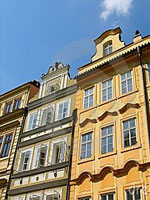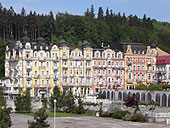How to Buy Real Estate in Czech Republic (Guide)
How high are realtors´ and lawyers´ fees in Czech Republic? What about other property purchase costs?
 How difficult is the property purchase process in Czech Republic?
How difficult is the property purchase process in Czech Republic?
Since the accession to the EU, and particularly since the adoption of the last amendment to the Foreign Exchange Act, it has become much easier for nonresident EU nationals to buy property in the Czech Republic.
The following can buy real estate without any restriction:
- Czech citizens
- Legal entities headquartered in the Czech Republic
- Foreigners with a permanent residence permit for the Czech Republic
- People granted asylum in the Czech Republic
Though after long and intense parliamentary discussions, it was decided that citizens of the EU without Czech residence permit would be restricted from buying property for a 7 years transition period, i.e., until 2009, in practice things have become much less restrictive.

Citizens of the EU (plus Iceland, Norway and Liechtenstein) can get permission to ´reside´ in the Czech Republic on demand, quickly, without providing any special reason. All they need is two photos, a passport or an ID-card, a certificate of health insurance from the EU or other EEA country, and an affidavit that they have sufficient funds not to become a burden on the social security system. No administrative fees are charged.
Citizens of the US are in almost the same position, due to a Supplementary Protocol to the Czechoslovak-U.S. Agreement on Mutual Support and Protection of Investment. They have the same rights to acquire real estate as the citizens of EU countries, Norway, Iceland and Liechtenstein. U.S. citizens therefore need only get a visa allowing them to stay in the Czech Republic for more than 90 days, in order to be able to acquire a second home in the Czech Republic, with no restrictions.
The process for non-EU, non-US citizens is more complicated. They must have a visa, remain in the Czech Republic for seven years (or marry a Czech citizen) to obtain a green card allowing them to buy property.
Alternatively they can buy property through a limited liability company (known as an s.r.o.). But only an EU citizen can control the company without Czech participation. A non-EU citizen must recruit a Czech person, EU citizen or person holding a long-term visa to be the company´s executive director.
A company comes into existence by registration in the Commercial Register of a competent regional court. To buy a shell company, a certain amount of documentation is required, which usually takes about 24 hours. The price for a shell company should not exceed CZK60,000 (€2,319) to CZK100,000 (€3,866) and the entire process should ideally take about 1 to 2 working days. The flat fee should include registration of all necessary institutional changes and any other procedural costs, and include a registered address for the company for 6 months from the purchasing date. You must then choose a company representative (Jendnatel), normally a Czech citizen or permanent resident who will have full access to the bank account and power of attorney over your business decisions, so choose carefully. During the first six months, the company can be transferred to the property bought with the SVP.
The s.r.o. must file for income tax once a year, which should cost around CZK10,000 (€387) per year in accounting charges.
Once you have found a property, commission a report to ensure title security, and the property´s quality. After the property has passed scrutiny, your Czech attorney and the real estate agent will draw up a) the reservation contract (intent to purchase) and b) the contract of deposit, which is the result of the parties negotiating and agreeing a price and down payment. The usual down payment is 10% to 30% of the price. Be cautious about signing a reservation contract before getting it checked by an independent lawyer. The agreements offered by real estate companies are often one-sided and sometimes even specifically designed for the buyer to lose his deposit.
Once a purchase contract has been signed by both parties, the buyer normally has to hand over the remaining amount of the purchase price, which will be kept in ´escrow´. The buyer will then apply to the property registrar to begin the transfer of title.
It takes an average of 31 days to complete all four procedures needed to register a property in Czech Republic, though procedures are now faster than they were in the past.
What are the buying and selling costs like in the Czech Republic?
Transaction Costs |
||
| Who Pays? | ||
| Legal Fees | 1% (+ 19% VAT) | buyer |
| Registration Fees | 0.01% - 0.02% | buyer |
| Agent´s Fee | 2.5% - 5% | buyer |
| Costs paid by buyer | 3.51% - 6.02% | |
| Costs paid by seller | 0% | |
| ROUNDTRIP TRANSACTION COSTS | 3.51% - 6.02% | |
| See Footnotes Source: Global Property Guide |
||
Footnotes to Transaction Costs Table
The round trip transaction costs include all costs of buying and then re-selling a property - lawyers´ fees, notaries´ fees, registration fees, taxes, agents´ fees, etc.

 Legal Fees:
Legal Fees:
Legal fees are generally negotiable.
 Registration Fee:
Registration Fee:
Registration fees include verification of two signatures by notary, and stamps in the cadastral office.
| REGISTRATION FEE | COSTS, CYP (€) |
| Verification of 2 signatures by notary - CZK30 (€1) per signature + 20% VAT | 71.40 (€3) |
| Stamps in the Cadastral Office | CZK1000 (€36) |


 Agent´s Fee:
Agent´s Fee:
The agent´s commission is around 2.5% to 5%. In Prague, real estate agent´s commission is paid either by the buyer or split between the buyer and seller. In Brno the commission is always paid by the buyer.